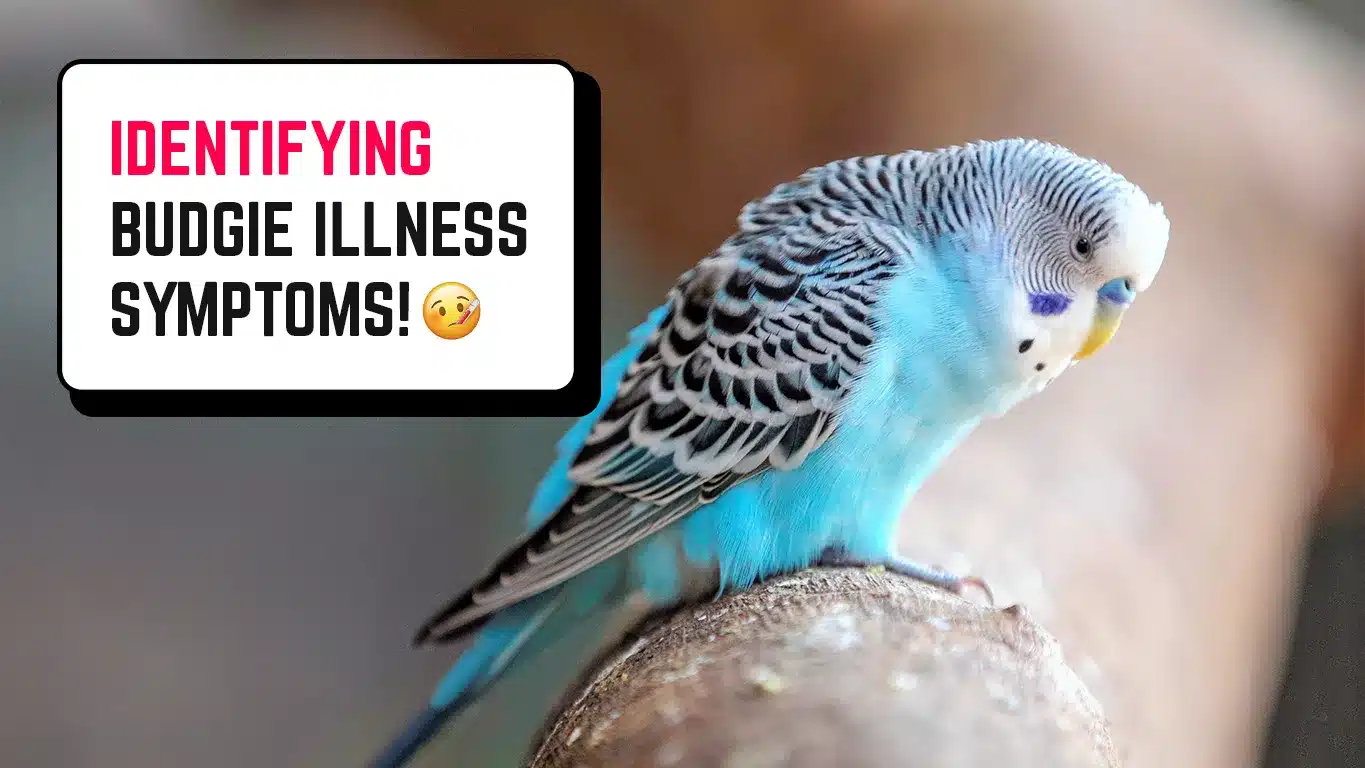Like other animals, your budgie can get sick. As a budgie owner, you are responsible for identifying their illness symptoms and giving them proper treatment.
If your budgie goes through illness then you’ll see some changes in their behavior, like being more tired or eating less. Moreover, physical symptoms include discharge from eyes or nostrils and different looking feathers.
Through this article, I will help you in identifying budgie illness symptoms and also discuss more about this topic in detail. So keep reading!
How To Tell If A Budgie Is Sick?
I didn’t have the notion of my budgie getting sick until it happened, and it was stressful. That is why I believe it is vital for all budgie owners to be familiar with budgie illness symptoms.
But what are the signs of illness in budgies? Well, here are more.
General Signs of Illness
- Fluffed Feathers: Budgies keep their feathers fluffed up when they feel cold. If the environment is warm but they are still doing it, it’s a sign of illness.
- Tail Bobbing When Breathing: The tail muscles work harder when the budgie has trouble breathing. That’s why you notice the tail bobbing as it breathes, which often indicates a life-threatening illness.
- Lethargy and Inactivity: Active birds like budgies don’t stay still or inactive unless they are feeling sick. If they show less or no interest in things that usually stimulate them, the budgie is likely to be sick.
- Loss of Appetite or Changes in Eating Habits: One of the common signs of budgie health issues is the loss of appetite. The budgie will show less interest in food and leave them untouched.
- Difficulty Perching: If the bird has difficulty perching or perches on two legs instead of one, it could be a sign of injury or weakness. Such a bird would usually sit on the cage floor rather than its go-to perch.
- Poor Feather Condition or Less Preening: When the bird feels sick and too weak to do anything, it gets difficult for it to preen or clean its feathers, resulting in poor feather condition.
- Balance Issues or Bad Posture: While a healthy budgie sits vertically, a sick one would sit leaning in a horizontal position.
- Excessive Sleeping or Listlessness: Just like humans or other animals, birds also sleep more when they don’t feel well.
- Changes in Vocalization: When the bird is in distress, it usually becomes more vocal and squeaks loudly. However, other signs include less chirping, singing, or making unusual sounds.
Physical Signs of Illness
- Abnormal Droppings: You should be concerned if the budgie dropping has an abnormal dropping and color, such as yellow, green, gray, or red. Also, if the dropping appears more liquid and the bird is pooping more frequently (due to diarrhea), it indicates budgie health problems.
- Discharge From the Eyes or Nostrils: Eye and nasal discharge can be an environmental reaction or sign of viral infection requiring medical attention.
- Vomiting: According to Dr. Phil Sacks from Bird Vet Melbourne, vomiting is common and often normal in birds. However, it may also happen due to infection, toxicity, allergic reaction, etc.
- Limping: If the budgie is limping, it must have gotten hurt or broken something. A vet would need to check the bird to find the cause and treat it.
- Overgrown or Crooked Beak and Toenail: It is often a sign of long-term illness, such as liver disease. If left ignored, it can result in death.
- Difficulty Breathing: Is the budgie wheezing or breathing rapidly? It is a sign of respiratory illness.
- Swollen Abdomen or Other Lumps: A swollen abdomen can be caused by obesity, abdominal neoplasia, egg peritonitis, etc.
- Weight and Feather Loss: Two of the easily recognizable budgie illness symptoms are loss of weight and feathers. The budgie could be suffering from severe illness or infectious diseases.
- Bleeding or Injuries: If you notice the budgie is bleeding or suffering from any injury, make sure to take it to a budgie veterinary care immediately.
Why Do Budgies Get Sick Easily?
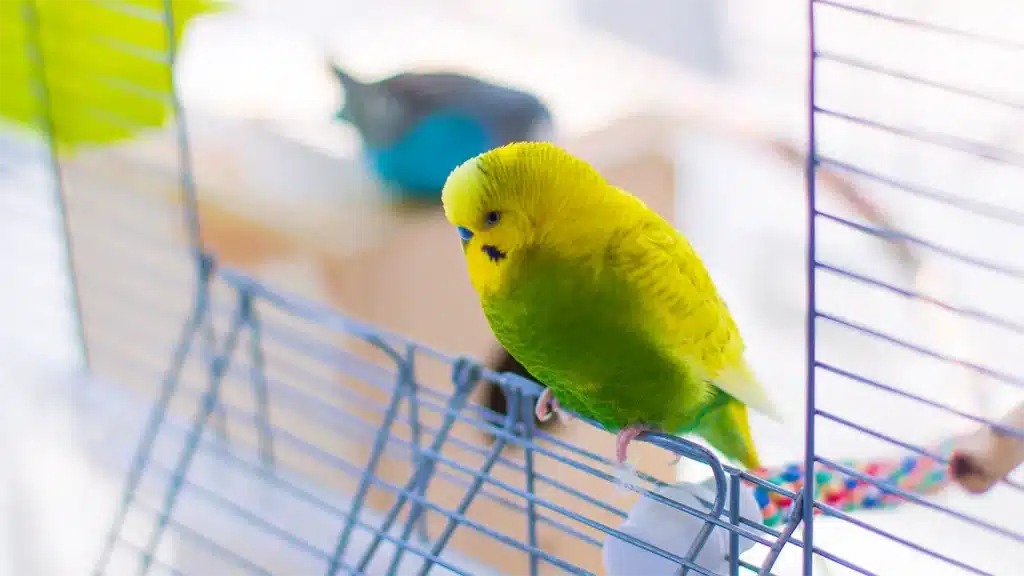
If your budgie is getting sick easily, it could be because of a few factors, such as poor immune system, genetic inheritance, environmental issues, poor diet, lack of maintenance, veterinary care, etc.
However, there are other causes, such as stress, lack of socialization, and getting bullied by other birds. Since budgies are social birds, you must keep them stimulated.
Also, make sure the budgie is not living in a loud environment. It can cause the budgie to get stressed, gradually leading to other problems and sickness.
Are Budgies Prone to Illness?
Budgies are not generally prone to illness. However, they often suffer from various diseases, such as colds, infections, digestive issues, respiratory problems, and more.
As I mentioned before, budgies can get sick due to genetic, environmental, and other causes as well. So, the best thing you can do as an owner is to be alert and pay attention to the symptoms of common budgie diseases.
Moreover, keeping the budgie in a clean place or maintaining hygiene is also vital to ensure the bird doesn’t catch any disease.
What Can Make My Pet Bird Sick?
One of the common reasons why pet birds get sick is the germs that they carry. According to the MSD Veterinary Manual, birds suffer from bacterial diseases due to inappropriate husbandry and nutrition. As a result, they suffer from liver problems, viral infections, parasitic diseases, feather problems, etc.
Let me explain them further!
- Bacterial Diseases: Birds often suffer from bacterial diseases due to a lack of hygiene and proper nutrition, which lowers their immune systems and makes them sick easily.
- Parasitic Diseases: Though it is more common in wild birds, pet birds can also get sick with parasitic diseases because of worms, protozoa, mites, etc. It results in irritation, feather loss, a scaly face, etc.
- Viral Diseases: Viral diseases in companion birds are transmitted by food, water, and other birds. Leaving it untreated can lead to death, making it essential to watch out for the symptoms.
- Nutritional Diseases: Pet birds get sick due to nutritional deficiency, such as deficiency of vitamins A, D, C, iron, etc. As stated in an article by the National Library of Medicine, an abundance of a nutrient, such as Hypovitaminosis A, can cause respiratory fungal infections and chronic rhinitis.
Can a Sick Budgie Get Better?
If you can recognize the sick budgie’s behavior and care for your budgie in time, the bird will get better in no time. The bird will also require rest and proper nutrition to fight illness.
As you treat and care for the bird, monitor its progress closely and stay connected to a vet.
How Do You Treat a Sick Budgie?
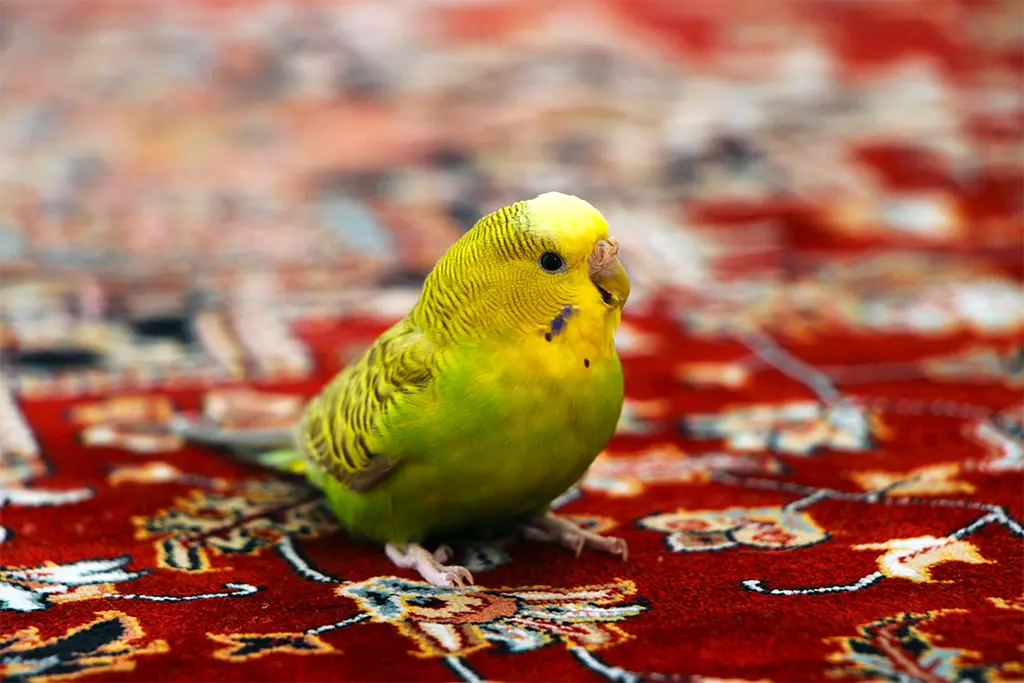
To treat a sick budgie, you have to follow and maintain a few things. Here is what you can do.
- Provide Warmth and Comfort: The first step to the budgie’s recovery is making sure it’s comfortable. Keep the room temperature warm enough for the budgie, or keep the cage covered with a blanket. The ideal environmental temperature should be 70°F to 75°F.
- Eliminate Stress and Noise: You must eliminate all sorts of things that cause stress in the bird. Try to keep it in a calm and quiet environment. While treating sick budgies, it is best to keep the birds separate from other birds to avoid such problems.
- Provide Nutrition and Medication: If the vet has prescribed medication, you must follow the instructions and provide modification. Also, you must add nutritious food to the budgie’s diet to help it regain strength and recover faster. You can feed the budgie using a syringe if it refuses to eat on its own.
- Monitor The Bird and Consult the Vet: Keep checking on the bird’s behavior. Take it to the vet for a follow-up examination if necessary.
Why Do Budgies Have Heart Attacks?
Budgies often have heart attacks due to trauma, sudden fear, stress, and genetic reasons. However, it can also be related to their diet, various health conditions, and chronic diseases.
Heart disease in pet birds is related to atherosclerosis. Sometimes, it is the result of a long period of chronic inflammation diseases. And unlike budgies in the wild, pet budgies are less active. They don’t exercise often, and they rely on a fixed diet.
As a result, the bird begins to suffer from various conditions, such as obesity, lethargy, exercise intolerance, etc. Common signs of heart disease in budgies include breathing difficulty. That is why it is vital to get the bird diagnosed by a vet if you notice the budgie illness symptoms.
What Is the Most Common Cause of Death in Budgies?
Some of the most common causes of death in budgies are granulomatous disease, trauma, avian gastric yeast, etc. However, there are other common causes, such as aging, wrong diet, long-term diseases, and accidental deaths.
Budgies are sensitive birds. That is why it is essential to watch their activities and diet to ensure they are doing well. Moreover, don’t let them loose with fans, burners, doors, and windows open, as they often cause accidental deaths.
What Are Symptoms of a Dying Budgie?
Some of the common signs of a dying budgie include breathing difficulty, wheezing, tail bobbing, not eating or no activity, vomiting, etc. When they are close to dying, they begin to appear weak, the feather remains fluffed and dirty, and you will also notice feces around their anus.
Whether the budgie is dying from illness or aging, it is mostly inevitable. So the best thing you can do is make its last moments comfortable. For that, try keeping the dying budgie separate from others at a warm temperature or keep it wrapped in a blanket.
Budgie Is Sick But Still Eating: Should I Be Concerned?
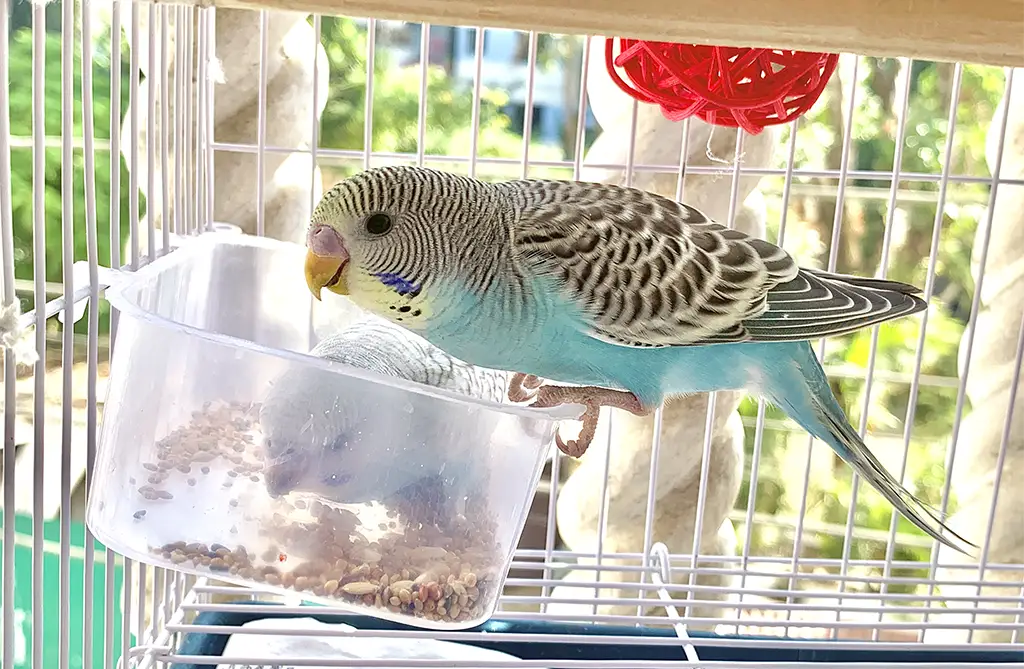
When a budgie gets sick or shows symptoms of sick budgies, it might refuse to eat. But if your budgie is eating, it is a positive sign. However, until the bird recovers completely, it will remain to be a matter of concern.
Moreover, just eating isn’t always the best sign if it is not eating enough. So you must ensure the budgie is getting enough rest and nutritious food. Also, make sure to check in with a vet during the bird’s recovery process.
What Are The Signs Of A Healthy Budgie?
After discussing all of these illness symptoms now I am going to talk about the symptoms of a healthy budgie. Because it’s important to know the good along with the bad ones.
A healthy budgie is full of energy, likes to play, and is curious. They like to interact with their surroundings, their toys, and you. Their energy levels can tell you if they are healthy.
Here’s a table to help you compare healthy and unhealthy symptoms in budgies. I hope this can be a quick way to check on your budgie’s well-being:
| Healthy Budgie Symptoms | Unhealthy Budgie Symptoms |
| Energy Levels Lively and energetic | Energy Levels Lethargic or less active |
| Feather Quality Smooth, vibrant, and clean feathers | Feather Quality Dull, ragged, or plucked feathers |
| Eating Habits Regular and enthusiastic eating | Eating Habits Loss of appetite or overeating |
| Vocalization Regular chirping and singing | Vocalization Less vocal or changes in vocalization |
| Behavior Playful, curious, and sociable | Behavior Aggressive, withdrawn, or unusual |
| Eye Appearance Bright and clear eyes | Eye Appearance Swollen or dull eyes |
| Breathing Steady and unlabored breathing | Breathing Rapid or labored breathing |
| Droppings Firm with a dark center and white urate | Droppings Watery, discolored, or abnormal |
| Movement Smooth and coordinated | Movement Limping or difficulty moving |
Final Words
So there you have it. I have discussed the budgie illness symptoms so you can tell when your feathered friend is unwell. First and foremost, it’s important to observe changes in their behavior, physical, and eating habits.
Moreover, understanding what a healthy budgie looks like is also important. If things seem serious, quickly get help from an expert vet.
FAQs About Budgie Illness Symptoms
What Are The Signs Of A Sick Budgie?
The signs of a sick budgie are fluffed-up feathers, lethargy, changes in eating habits, unusual droppings, and breathing difficulties.
Can A Sick Budgie Recover On Its Own?
Relying on self-recovery is risky. Some small issues might get better but many illnesses need a vet’s help. Waiting too long can make things worse. So always getting a vet’s advice is better.
How Can I Help My Sick Budgie Without A Vet?
Keep them warm and relaxed, offer easy and healthy food, and give them fresh water. Watch them closely. But if they have serious symptoms, see a vet as soon.
Will A Sick Budgie Still Eat?
It depends. Some might eat less or not be interested in food, while others eat like normal. You have to observe how much they eat to see how they’re doing. If they stop eating, that’s a serious sign.
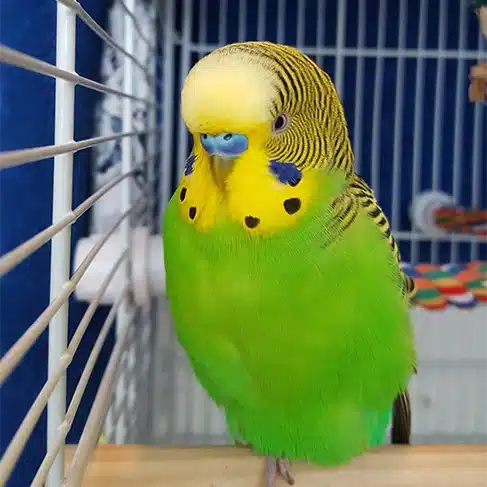
I’m Shajid Rahman, a happy owner of 6 beautiful budgies. I take care of this website to share tips, fun facts, and care guides about these birds.
Whether you’re a budgie lover or considering one as a pet, you’ll find helpful info here! I love these cute creatures, so I made this blog for Budgerigar fans. You can expect to get reliable information based on my years of experience. More About Me →

